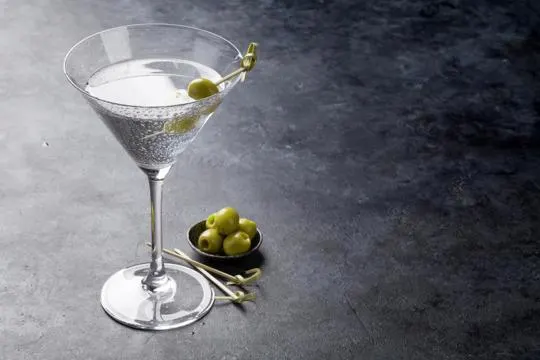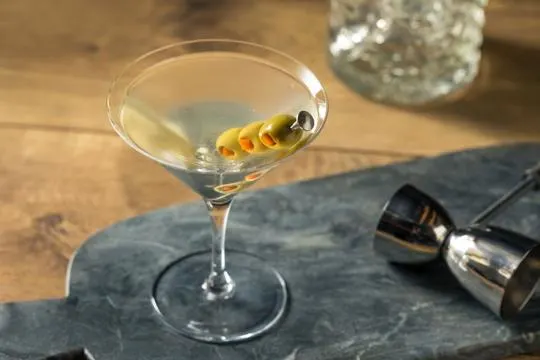Summary of key points
Gin Martini vs Vodka Martini differentiation lies in the base spirit. A Gin Martini is made with gin and vermouth, offering a botanical flavor profile, whereas a Vodka Martini, made with vodka and vermouth, provides a cleaner, more neutral taste. The choice between them depends on personal preference for the spirit’s flavor.
Ever found yourself at a fancy bar, menu in hand, utterly stumped over the choice between a gin martini and a vodka martini? We’ve all been there.
It’s like choosing between Batman and Superman in a cocktail showdown. Both have their fans, both have their moments. Here’s the lowdown, though: the difference isn’t just in the booze. It’s in the soul of the drink.
I remember my first gin martini—juniper berries danced on my palate. It was like a party in my mouth and everyone was invited. Fast forward to my first vodka martini experience, it was crisp, clean, like a fresh start on New Year’s Day.
Now, we’re not here to declare a winner. Nope. We’re about to deep-dive into what makes each martini tick. Think of us as your guide in this mixed drink maze.
What is a Gin Martini?

The Gin Martini is a classic cocktail, blending together the exquisite flavor of gin with the crispness of a martini.
It is made with a two-to-one mix of gin and dry vermouth, then stirred or shaken with ice and strained into a chilled martini glass.
To add to the taste and presentation, olives, lemon twists, or cocktail onions can be added as garnishments.
Gin is the key ingredient, giving the Martini its unique flavor profile.
It’s made from juniper berries and other botanicals, creating an herbal taste that makes this cocktail more aromatic and flavorful than others.
The Gin Martini has a long history, popularized by James Bond in Ian Fleming’s novels.
It’s been linked to sophistication and class ever since, which is why it’s a favorite among cocktail connoisseurs.
The garnishments also have an impact on the flavor.
Olives provide a briny taste to offset the herbal notes, while lemon twists bring out a citrusy aroma.
Cocktail onions contribute a touch of sweetness that pairs nicely with the dryness of vermouth.
What is a Vodka Martini?

A vodka martini is a classic, sophisticated cocktail.
It has gained lots of popularity over the years.
To make it, you combine vodka with dry vermouth and garnish with an olive or a lemon twist.
This delicious mix is known for its smoothness and versatility.
The difference between vodka martinis and other variations? It’s the base spirit.
Gin martinis use gin for the main ingredient.
Vodka martinis, on the other hand, use vodka.
This difference alters the flavor of the drink.
Vodka is neutral and offers a fresh taste.
This allows other elements of the cocktail to stand out.
Vodka martinis are great for experimentation.
Vodka is compatible with various mixers and garnishes.
You can create unique flavors, from fruity twists to spicy infusions.
Plus, vodka brings smoothness to the cocktail.
Unlike gin, which can be more botanical, vodka imparts a softer, more refined character.
Perfect for those who prefer milder tastes or are new to martinis.
Differences Between Gin Martini and Vodka Martini

Gin and Vodka Martini – two different drinks.
Base Spirit
When it comes to cocktails, the base spirit matters.
For example, gin and vodka martinis.
Gin is made from botanicals, giving it a complex flavor.
On the other hand, vodka is neutral, with a smooth taste.
This difference in base spirits creates a noticeable distinction between gin and vodka martinis.
Gin martinis have been favored for their unique flavor.
This is because of the botanicals like juniper berries, coriander seeds, and citrus peels used during distillation.
When combined with dry vermouth, it creates a refreshing and herbaceous martini.
Vodka martinis are known for their simplicity and purity.
Vodka’s neutral flavor allows other ingredients to shine.
It provides a canvas for mixers like vermouth or olive brine.
Vodka martinis have a straightforward taste that appeals to those who prefer a pure drinking experience.
Apart from the difference in taste, there are other details worth mentioning.
Gin martini lovers may opt for dry gin.
Vodka martini enthusiasts may choose flavored or infused vodkas.
Garnishes also play an essential role in both cocktails.
Gin martinis are often garnished with olives or lime twists.
Vodka martinis may feature garnishes like olives or cucumber slices.
Flavor Profile
The flavor of a cocktail is key.
Gin and Vodka Martinis are distinct.
Gin brings a complex mix of juniper, coriander, citrus and herbs – making it aromatic and refreshing.
Vodka, on the other hand, is smooth and allows the other flavors to stand out.
Personal preference matters too – some like bold gin, others mild vodka.
Exploring both options helps you find your own unique tastes.
So, whether it’s gin’s vibrant notes or vodka’s understated elegance – you can enjoy your Martini every time.
Historical Origins
Gin and vodka martinis have different beginnings.
Gin martinis trace back to 19th century Europe, particularly England, when gin was a fashionable drink.
Vodka martinis came about in the mid-20th century in America.
Both drinks are served in martini glasses and garnished with a twist.
Gin martinis were made with London dry gin, known for its juniper flavor.
Vermouth was added to create a classy cocktail.
Vodka martinis became popular when Russian immigrants arrived in America in the early 20th century.
After World War II, American soldiers came home with a taste for vodka, and it was used as an alternative to gin in classic cocktails.
Vodka has a neutral flavor, allowing for customization.
This is how the famous “shaken, not stirred” vodka martini was born.
The two cocktails’ histories show how culture affects mixology.
Today, both types of martinis are enjoyed throughout the world.
They represent class and sophistication.
Similarities Between Gin Martini and Vodka Martini

Gin and vodka martinis share similarities.
They both have the same structure and make sophisticated drinks.
Gin and vodka are common ingredients in these cocktails.
Both give distinct flavors.
Dry vermouth is also a key ingredient, adding depth and complexity.
And, they are usually garnished with olives or lemon twists.
But, they also have differences.
Gin has a botanical flavor from herbs and spices, while vodka has a neutral taste.
Gin martinis have a long history in British culture, while vodka martinis rose in popularity in the mid-20th century.
They became a glamorous drink.
Popular Variations and Garnishes
Martinis have many variations and garnishes that can change their taste.
Traditional options, like the dirty martini with olive brine, or the Gibson with a pickled onion, provide savory flavor.
Fruity and tangy cosmopolitans are for those wanting something sweet.
Mixologists can get creative with garnishes like cucumber slices, jalapeno peppers and edible flowers.
With so many options, everyone can find their perfect martini tailored to their tastes.
How to Make the Perfect Gin Martini and Vodka Martini
Crafting the perfect gin and vodka martini is easy with just a few steps.
Firstly, collect the required ingredients: gin, dry vermouth and ice cubes for gin martini.
And for vodka martini, you’d need vodka, dry vermouth and ice cubes.
Next, pour the desired amount of gin or vodka into a mixing glass filled with ice cubes.
Add a splash of vermouth and stir gently for 30 seconds.
This will blend the flavors and chill the drink.
Strain the cocktail into a chilled martini glass.
Now, some unique details: You can garnish the martinis with olives or lemon peel.
Or add cocktail onions (known as Gibson) or experiment with flavored garnishes like cucumber or jalapeno.
And you’ll be able to craft a perfect gin or vodka martini every time.
Conclusion
To summarize our gin martini vs vodka martini breakdown, gin martinis are definitely punchier and provide a brighter flavor than vodka martinis – they’ll help you feel a bit more glam.
Vodka martinis have more of a subtle taste, making them a classic cocktail selection for social gatherings and parties.
Now that we’ve broken down the basics, try testing out different styles of both to find your favorite.
For instance, maybe you like extra dry gin martinis or maybe you prefer a vodka frozen drink? If you’d like something stronger, simply adjust the pour size and make sure to avoid overpouring.
Ultimately, what makes the best gin or vodka martini is truly up to you.
After all, even though dimensions of quality remain identical traits in each variant, there are still bold nuances within each pour that can change your experience entirely.
With so many options at hand, mixology will surely become one of your favorite hobbies.

Gin Martini vs Vodka Martini: What’s the Difference?
Ingredients
- Gin Martini
- Vodka Martini
Instructions
- Decide between a Gin Martini and a Vodka Martini based on your preference for spirits.
- Prepare a cocktail shaker with ice.
- Add 2.5 ounces of your chosen spirit (gin or vodka) into the shaker.
- Optionally, add 0.5 ounces of dry vermouth for a classic Martini, or adjust to your preferred level of dryness.
- Stir or shake vigorously until well chilled.
- Strain the mixture into a chilled martini glass.
- Garnish with a twist of lemon or olive, as per your preference.
- Sip and savor the distinct character of your Gin Martini or Vodka Martini, and enjoy the classic cocktail experience.

Andrew Gray is a seasoned food writer and blogger with a wealth of experience in the restaurant and catering industries. With a passion for all things delicious, Andrew has honed his culinary expertise through his work as a personal chef and caterer.
His love for food led him to venture into food writing, where he has contributed to various online publications, sharing his knowledge and insights on the culinary world. As the proud owner of AmericasRestaurant.com, Andrew covers a wide range of topics, including recipes, restaurant reviews, product recommendations, and culinary tips.
Through his website, he aims to inspire and educate fellow food enthusiasts, offering a comprehensive resource for all things food-related.

Leave a comment